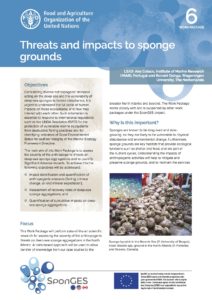Objectives. Considering diverse anthropogenic stressors acting on the deep sea and the vulnerability of deep-sea sponges to human disturbance, it is urgent to understand the full scale of human impacts on these ecosystems, and how they interact with each other. Such information is essential to respond to international regulations such as the UNGA Resolution 61/105 for the protection of Vulnerable Marine Ecosystems from destructive fishing practices and for identifying indicators of Good Environmental Status for sea floor integrity of the Marine Strategy Framework Directive. The main aim of Work Package 6 is to assess the severity of the anthropogenic threats on deep-sea sponge aggregations and to quantify Significant Adverse Impacts. To achieve this the following objectives will be addressed:
- Impact identification and quantification of anthropogenic stressors (fishing, climate change, oil and mineral exploitation);
- Assessment of recovery rates of deep-sea sponge aggregations; and
- Quantification of cumulative impacts on deep-sea sponge aggregations.
Focus. This Work Package will perform state-of-the-art scientific research for assessing the severity of the anthropogenic threats on deep-sea sponge aggregations in the North Atlantic. A traits-based approach will be used to allow transfer of knowledge from our case studies to the broader North Atlantic and beyond. The Work Package works closely with and is supported by other work packages under the SponGES project.
Why is this important? Sponges are known to be long-lived and slow-growing, so they are likely to be vulnerable to physical disturbance and environmental change. Furthermore, sponge grounds are key habitats that provide ecological functions such as shelter and food, and are part of the nutrient cycles. Understanding the impacts of anthropogenic activities will help to mitigate and preserve sponge grounds, and to maintain the services to humanity that the sponge grounds provide. Deep-sea sponge aggregations are listed under the OSPAR List of threatened and/or declining species and habitats (OSPAR agreement 2008-6).
Discover more about SponGES WP6 – download the WP6 Infosheet here.
